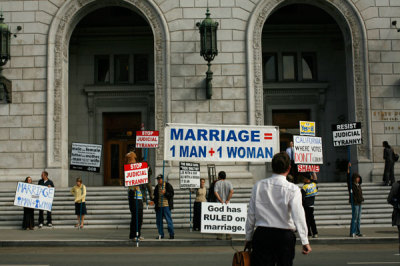Gay Marriage: Prop. 8 Proponents Optimistic After Court Hearing
Both sides of the legal battle in California over Proposition 8 – the 2008 voter-approved ballot initiative that defined marriage as between a man and a woman – faced off yet again and argued their case in a federal appeals court Thursday.

Two points of contention were argued before the U.S. 9th Circuit Court of Appeals including the motion by Prop. 8 opponents to release the 2010 district court trial video to the public and the motion by Prop. 8 supporters to have the judge in the case invalidated.
Senior Legal Counsel Austin R. Nimocks of the Alliance Defense Fund, told The Christian Post after the hearings Thursday that he thought the court proceedings favored the ProtectMarriage.com (official proponents of Prop. 8) team of attorneys. However, the question remains as to when the three-judge panel rulings will be made.
"I think the hearings went very well. Unfortunately, this is the fifth time the proponents of Proposition 8 have had to seek appellate review of the errors that the district court made," he said. "This is the third time we've been to the 9th Circuit. We've been to the California Supreme Court and every time the courts have had to correct the errors that Judge Walker made."
"We feel very confident that yet again on these issues the court will again correct these substantial errors that Judge Walker made," Nimocks said.
Prop. 8 was passed by 52 percent of California voters in November 2008, months after the California Supreme Court had legalized same-sex marriage in May that year. The state's high court upheld the amendment but did not void same-sex marriages that occurred between its 2008 ruling and the passage of Prop. 8.
Last August, however, then Chief U.S. District Judge Walker struck down the measure as unconstitutional. He concluded that moral disapproval alone is an improper basis on which to deny legal marriage to gay men and women.
Lawyers for Prop 8. previously filed a motion saying that Walker, who presided over the 2010 case, should have recused himself because he did not reveal he was in a long-term same-sex relationship.
"Walker should have removed himself of the case so that he was not essentially sitting as a judge in his own case since he was situated with his same-sex partner in the exact same position as the plaintiffs were in this particular case," Nimocks said. "No judge should be the judge of their own case."
Chief Judge James Ware, who replaced Walker and was an observer in the court Thursday, rejected that argument earlier this year, prompting the appeal by the Prop 8. lawyers.
On Thursday, lawyers for same-sex couples argued that disqualifying Walker would be the same as not allowing minority or female judges from ruling on civil rights cases relevant to them, the Mercury News reported.
Another point of contention has been the motion seeking an order to unseal the video recording of the district court trial. The motion was previously filed by lawyers seeking to invalidate the Prop 8. amendment.
The video recording of the trial is currently under seal after the U.S. Supreme Court prevented a San Francisco federal judge from allowing a live broadcast of the January 2010 trial.
A lawyer for the two same-sex couples whose lawsuit began the legal battle in court said public access to the record was of utmost importance. He added that courts often take another look at decisions to seal content, reported the Los Angeles Times.
David Thompson, an attorney for ProtectMarriage.com, told the appeals court Thursday that the video's release would hinder future testimony in controversial court cases because witnesses would be intimidated, according to news reports from the trial.
The promise that Walker made to not use or distribute the court video should be upheld, Nimocks argued.
"The American people deserve a court system that upholds the integrity of the judicial process," he said. "The orders we are requesting are necessary for that reason. Violating standards, rules, and court orders threatens to undermine the public's confidence in the federal court system."
Nimocks said that there is a chance for more appeals to the U.S. Supreme Court once the decisions by the appeals court are made.

 Proposition 8 Court Battle Continues
Proposition 8 Court Battle ContinuesThe court cases on the state and federal level, which came after the election in which a majority of California voters supported Prop. 8 is now nearly 3 years old.
"You could have a situation where part of the case is in the Supreme Court and part of it is in the 9th Circuit," he said. "It could be that literally pieces of the case will be going back and forth between the courts as things progress."
In November, the California Supreme Court ruled that proponents of Prop. 8 have legal standing to defend the amendment in federal court. However, Nimocks said a still more technical legal question remains, and that is whether the state court's ruling will stand up in federal court under another needed article of law.
Nimocks said he remains confident that court cases will continue to go in favor of traditional marriage proponents.





























